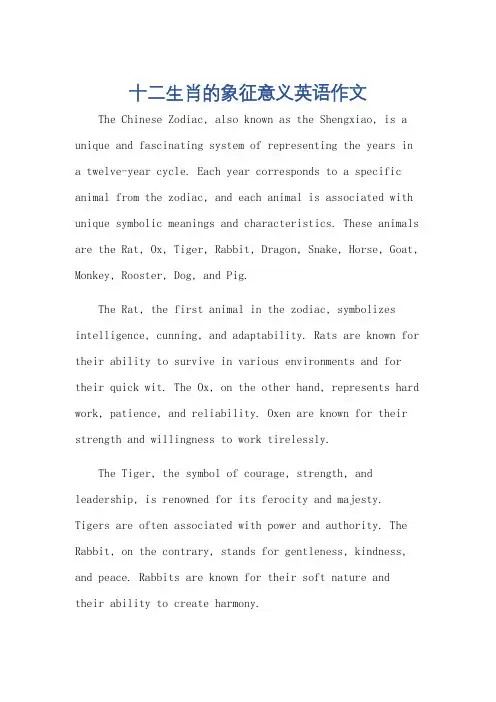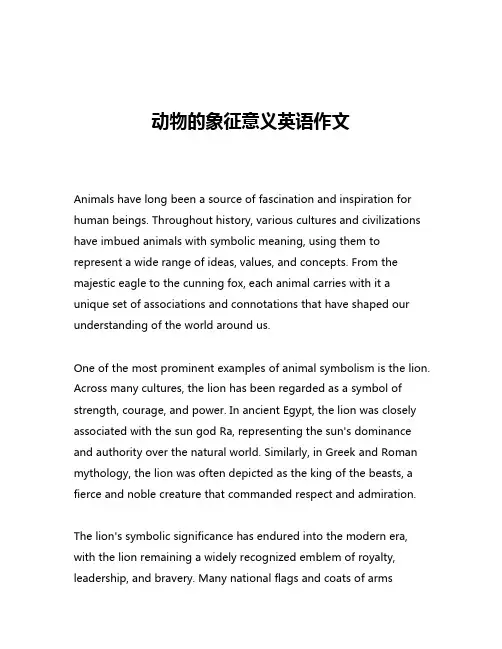英语中动物的象征
- 格式:ppt
- 大小:6.44 MB
- 文档页数:46

1.cat(猫)俗话说“猫有九命”,这就是汉语得说法。
此外,中国人常戏称嘴馋得人为“馋猫”。
cat在西方就是人们宠爱之物(pet),但令人奇怪得就是,在英语俚语中,cat得含义为a spiteful or unpleasant woman(心地恶毒或令人讨厌得女人)。
照此瞧来,似乎就是中国得猫可亲,西方得猫可恶了。
2.dog(狗)在英语中dog得形象一般不差,常可泛指“个人”。
如谚语:Every dog has his day.(人人皆有得意日。
)又如:a gay dog(快活得人、好玩得人)。
但dog也有形象不佳之时。
如:dog eat dog(注意eat为原形),意指“人们自相残害”;同样,a dog in the manger喻“占着茅坑不拉屎得人”。
在汉语里,尽管狗在某些地方也为宠物,但“狗”得形象总就是不雅,因而用来指人时多含贬义。
如“狗咬狗”、“哈巴狗”、“走狗”、“狗仗人势”、“癞皮狗”等等。
3.pig(猪)pig所受待遇可谓最糟,人们总就是一边吃猪肉(pork),一边又对猪恶语相加。
汉语里,猪集“懒、笨、馋”于一身,借此喻人具有刻毒之意,其用语不胜枚举。
英国人也给pig以丑恶得形象。
a pig意为a greedy,dirty or bad-mannered person(贪婪、肮脏或无礼貌得人)。
注意,最后一喻意似乎未进入汉语。
4.rat(鼠)汉语中得“胆小如鼠、鼠目寸光、鼠肚鸡肠”及“鼠辈”等词语,皆有“畏琐、卑微”及“心胸狭窄”等含义,可见鼠在汉语中简直一无就是处。
作为俚语,英语得rat指人时喻意与汉语稍有出入,但也含贬义:a rat即a person who behaves selfishly (自私得人)或a person who is disloyal(不忠得人)。
5.ass(驴)汉语有“笨驴”之说,用来指人,则表达“愚、笨”之意。
英语同汉语在这一点上有相通之处:an ass意为a foolish person(傻瓜),同义语还有donkey,但常用来指小孩。

从动物词汇看英汉文化内涵一、英语中动物词汇的象征含义及其构词类型1.表示动物的单词。
(1)bee:蜜蜂,象征勤劳,人们常用as busy as a bee来形容某人忙忙碌碌。
(2)beetle:甲虫,象征盲目,当作名词用时可以指近视眼,当作不及物动词时可以指某人乱撞、瞎撞。
(3)cat:猫,象征欺骗,常用来形容某人心地恶毒。
(4)goose:鹅,象征自负、愚蠢,常用来指某人是呆头鹅或傻瓜。
(5)monkey:猴子,象征诡计,可指某人捣鬼、瞎弄。
(6)nightingale:夜莺,象征悲寂,诗人济慈就曾写下《夜莺颂》以抒发悲寂、忧伤的心情。
(7)swan:天鹅,象征优雅或才华横溢,因此人们也用the Swan of Avon(艾冯河畔的天鹅)指Shakespeare。
(8)chicken:小鸡,象征胆小、懦弱的人。
2.由动物单词构成的复合词。
(1)dog:狗,象征忠诚。
如:dog-1ike常用来指某人像狗一样地忠于主人。
(2)dove:鸽子(一般指小野鸽),象征天真无邪,无害于人。
如:dove-eyed(双眼温柔无邪的),dove-like((鸽子般)纯洁可爱的,温柔的)。
(3)eagle:鹰,象征灵感,敏锐。
如:eagle-eyed(眼力敏锐的,目光炯炯的)。
(4)hare:野免,象征胆小。
如:hare-hearted指人胆小的,易受惊的。
(5)hawk:鹰,象征贪婪,敏锐。
如:hawk-eyed(目光锐利的),hawk-nosed(长着鹰钩鼻子的。
)(6)owl:猫头鹰,象征智慧。
如:owl-wise指像猫头鹰一样聪慧。
(7)pigeon:鸽子(常指家鸽),象征胆怯。
如:pigeon-hearted(怯懦的),pigeon-livered(温柔的)。
(8)puppy:小狗,象征自负,幼稚。
如:puppy-love(初恋)。
3.由动物单词构成的短语、成语(1)bull:公牛,象征直来直去和力量。


十二生肖的象征意义英语作文The Chinese Zodiac, also known as the Shengxiao, is a unique and fascinating system of representing the years in a twelve-year cycle. Each year corresponds to a specific animal from the zodiac, and each animal is associated with unique symbolic meanings and characteristics. These animals are the Rat, Ox, Tiger, Rabbit, Dragon, Snake, Horse, Goat, Monkey, Rooster, Dog, and Pig.The Rat, the first animal in the zodiac, symbolizes intelligence, cunning, and adaptability. Rats are known for their ability to survive in various environments and for their quick wit. The Ox, on the other hand, represents hard work, patience, and reliability. Oxen are known for their strength and willingness to work tirelessly.The Tiger, the symbol of courage, strength, and leadership, is renowned for its ferocity and majesty. Tigers are often associated with power and authority. The Rabbit, on the contrary, stands for gentleness, kindness, and peace. Rabbits are known for their soft nature andtheir ability to create harmony.The Dragon, a mythical creature, represents power, wisdom, and good luck. Dragons are often associated with royalty and divinity in Chinese culture. The Snake, on the other hand, symbolizes transformation, healing, and wisdom. Snakes are often seen as symbols of rebirth and renewal.The Horse, a symbol of freedom, speed, and strength, represents the spirit of adventure and the pursuit of dreams. Horses are known for their speed and endurance. The Goat, on the contrary, represents gentleness, patience, and creativity. Goats are often associated with art and culture. The Monkey, a symbol of wit, cleverness, and adaptability, represents intelligence and playfulness. Monkeys are known for their mischievous nature and their ability to adapt to various situations. The Rooster, on the other hand, stands for punctuality, honesty, and hard work. Roosters are often associated with the start of a new day and the beginning of new opportunities.The Dog, a symbol of loyalty, friendship, and bravery, represents faithfulness and protection. Dogs are known for their devotion to their owners and their willingness to sacrifice for those they love. Finally, the Pig, a symbolof wealth, fortune, and fertility, represents prosperityand abundance. Pigs are often associated with luck and good fortune.The Chinese Zodiac not only provides a unique way of representing the years but also offers insights into the values and beliefs of Chinese culture. Each animal represents a different aspect of human nature and serves as a reminder of the qualities we should strive to cultivatein ourselves. As we journey through life, the symbols ofthe Chinese Zodiac can guide us and inspire us to become better versions of ourselves.**十二生肖的象征意义**中国生肖,也称为生肖,是一种独特且迷人的系统,用十二年一个周期来代表年份。

动物的象征意义英语作文Animals have long been a source of fascination and inspiration for human beings. Throughout history, various cultures and civilizations have imbued animals with symbolic meaning, using them to represent a wide range of ideas, values, and concepts. From the majestic eagle to the cunning fox, each animal carries with it a unique set of associations and connotations that have shaped our understanding of the world around us.One of the most prominent examples of animal symbolism is the lion. Across many cultures, the lion has been regarded as a symbol of strength, courage, and power. In ancient Egypt, the lion was closely associated with the sun god Ra, representing the sun's dominance and authority over the natural world. Similarly, in Greek and Roman mythology, the lion was often depicted as the king of the beasts, a fierce and noble creature that commanded respect and admiration.The lion's symbolic significance has endured into the modern era, with the lion remaining a widely recognized emblem of royalty, leadership, and bravery. Many national flags and coats of armsfeature the lion as a prominent symbol, underscoring its enduring status as a representation of strength and authority. Additionally, the lion's association with the sun and its position atop the animal kingdom hierarchy have made it a powerful symbol of masculinity and virility in many cultural contexts.Another animal that has captured the human imagination is the eagle. Known for its majestic flight, keen eyesight, and formidable hunting prowess, the eagle has long been revered as a symbol of power, wisdom, and divine authority. In ancient Greece, the eagle was closely linked to the god Zeus, the ruler of the Olympian pantheon, while in Native American cultures, the eagle was often seen as a messenger of the Great Spirit, a conduit between the earthly and spiritual realms.The eagle's symbolic significance has also been embraced by many modern nations, with the bald eagle serving as the national emblem of the United States. The eagle's association with strength, courage, and lofty vision has made it a popular symbol of national pride, military might, and the pursuit of lofty ideals. Moreover, the eagle's ability to soar high above the earth has imbued it with a sense of transcendence and spiritual enlightenment, making it a potent symbol in many religious and philosophical traditions.Another animal that has captured the human imagination is thesnake. While the snake is often associated with negative qualities such as deceit, treachery, and evil, it has also been imbued with more positive symbolic meanings in various cultural contexts. In ancient Egypt, the snake was revered as a symbol of renewal and rebirth, with the shedding of its skin seen as a metaphor for the cycle of life and death. Similarly, in many Native American traditions, the snake was viewed as a symbol of wisdom, healing, and the interconnectedness of all living things.The snake's ability to move silently and strike with lightning-fast precision has also made it a powerful symbol of cunning, adaptability, and transformation. In the Judeo-Christian tradition, the snake is famously associated with the temptation of Eve in the Garden of Eden, representing the seductive power of sin and the dangers of succumbing to temptation. However, in other cultural contexts, the snake has been seen as a symbol of fertility, regeneration, and the cyclical nature of existence.Another animal that has captured the human imagination is the wolf. Often portrayed as a fierce, predatory creature, the wolf has also been imbued with a range of symbolic meanings that reflect both its negative and positive qualities. In many Native American traditions, the wolf was revered as a symbol of loyalty, family, and the importance of community. The wolf's strong pack mentality and fierce protection of its young were seen as admirable qualitiesworthy of emulation.However, in European folklore and mythology, the wolf has often been depicted as a symbol of danger, aggression, and the wild, untamed forces of nature. The werewolf legend, in which a human transforms into a wolf-like creature, reflects the widespread fear and fascination with the wolf's perceived savagery and unpredictability. Despite these negative associations, the wolf has also been viewed as a symbol of freedom, independence, and the untamed spirit of the natural world.The symbolic meaning of animals extends far beyond these examples, with each creature carrying its own unique set of associations and connotations. The elephant, for instance, is often seen as a symbol of strength, wisdom, and good luck in many Asian cultures, while the dolphin is associated with playfulness, intelligence, and a connection to the sea. The butterfly, with its delicate beauty and transformation from caterpillar to winged creature, has long been a symbol of change, rebirth, and the fragility of life.Ultimately, the symbolic meaning of animals reflects the deep and abiding connection between human beings and the natural world. By imbuing animals with symbolic significance, we have sought to understand our place within the broader ecosystem, to draw inspiration from the natural world, and to tap into the universalarchetypes and mythologies that have shaped our collective consciousness. Whether as totems, emblems, or metaphors, animals continue to captivate and inspire us, reminding us of the rich tapestry of life that surrounds us and the enduring power of the natural world to shape our understanding of ourselves and our place in the universe.。

英汉动物词不同的文化内涵探究
1. 狮子(Lion):在英语中,狮子被认为是勇敢和威武的象征,常被用来表示英勇和权势。
而在中国文化中,狮子被视为吉祥的象征,常被用来装饰庙宇和建筑,代表着权威和荣耀。
2. 龙(Dragon):在英语中,龙常常被描绘为充满力量和神秘的生物,常被用来表示勇敢和荣耀。
而在中国文化中,龙是中国的传统神兽,被视为中国文化的象征,代表着权威和吉祥。
3. 熊(Bear):在英语中,熊往往被视为强大和勇敢的象征,常被用来表示勇敢和力量。
而在中国文化中,熊被视为可爱和和平的象征,常被用来表示柔和和友善。
4. 鸡(Chicken):在英语中,鸡常被用来表示胆小和懦弱。
而在中国文化中,鸡是春节中重要的象征动物,被视为吉祥的象征,常被用来表示幸福和富裕。
总之,英汉动物词不同的文化内涵在于不同文化中对动物的象征意义和表达方式的差异。
这些差异反映了不同文化对于勇敢、权威、吉祥等价值观的理解和重视程度。
了解这些文化内涵可以帮助人们更好地理解和交流不同文化之间的差异。

英语中的动物及其文化寓意来源:英语中的动物及其文化寓意来源:动物名词及其文化喻意日常生活中,人一般不能与动物相提并论,但语言中却有不少借动物的特性来形容人的特性的词语。
值得注意的是,这种比喻性表达法往往因语言、文化的不同而具有不同的含义。
下面,我们比较一下英汉语言中同一动物名词的不同喻意。
1.cat(猫)俗话说“猫有九命”,这是汉语的说法。
此外,中国人常戏称嘴馋的人为“馋猫”。
cat在西方是人们宠爱之物(pet),但令人奇怪的是,在英语俚语中,cat的含义为a spitefulor unpleasant woman(心地恶毒或令人讨厌的女人)。
照此看来,似乎是中国的猫可亲,西方的猫可恶了。
2.dog(狗)在英语中dog的形象一般不差,常可泛指“个人”。
如谚语:Every dog has hi s day.(人人皆有得意日。
)又如:a gay dog(快活的人、好玩的人)。
但d og也有形象不佳之时。
如:dog eat dog(注意eat为原形),意指“人们自相残害”;同样,a dog in the manger喻“占着茅坑不拉屎的人”。
在汉语里,尽管狗在某些地方也为宠物,但“狗”的形象总是不雅,因而用来指人时多含贬义。
如“狗咬狗”、“哈巴狗”、“走狗”、“狗仗人势”、“癞皮狗”等等。
狗是人类患难与共的朋友,被认为是通人性的动物,它对人类特别忠诚,因而具有忠贞不渝的意义。
“牧羊犬三千里寻主”,“义犬救主”等例子很好地说明了这一点,“犬马之劳”也就用来比喻事做忠心耿耿。
不过狗爱仗人势,“走狗”便含有贬义,鲁迅先生描写的“丧家的资本家的乏走狗”象征了那类没有民族骨气的无耻文人。
不过,从民俗学的角度来看,狗还有一些其他的含义。
总的来说,中国人把狗视为吉利的动物,如果谁的家里突然来了一只狗,主人就会很高兴地收养它,因它预示财富来临,所谓“猫来穷,狗来富”。
狗和主人同甘共苦,如果有什么灾祸来临,它也会预示前兆,比如狗上房是暗示盗贼将至。

探究在英语谚语中关于动物“猫”的隐喻
猫是一种经常出现在英语谚语中的动物,它在这些谚语中常常被用作隐喻的象征。
猫在英语文化中有着各种不同的象征意义,包括灵巧、狡猾、独立、神秘等。
猫经常被用来形容某人灵巧或机智。
“像猫一样的灵活”意味着某人具有非常敏捷和灵巧的身手。
这是因为猫以其前所未有的柔韧性和敏锐的观察力而闻名,它们可以迅速适应并从各种各样的情况中逃脱或抓住猎物。
猫也常被用来形容某人狡猾或诡计多端。
类似于谚语“乌鸦看呆了,小猫逞能”,这个谚语暗示猫利用它的聪明才智来欺骗其他动物。
猫的伪装能力和突如其来的攻击方式经常被人们运用在描述一些狡诈行为上。
猫还被描述为独立的动物。
谚语“抓到猫尾巴”暗示某人无法控制或捕捉一个非常狡猾的猫。
这个谚语意味着猫有自己的意志和决心,并且不容易被他人操控。
猫也经常与神秘和超自然的力量联系在一起。
有时候,猫被认为有着第六感,可以感知到超自然的存在。
这也是为什么猫常常被描述为黑色的动物,因为黑色在许多文化中都与神秘和超自然的力量联系在一起。

英语中的十二生肖作者:来源:《阅读与作文(英语高中版)》2019年第08期春节期间,大街小巷都洋溢着节日的欢乐气息。
现在同学们或许正在忙着过年:置办年货、包饺子、贴春联、放鞭炮,当然也少不了满口“猪年大吉”“豬年快乐”地走亲戚。
那么你知道十二生肖用英语怎么表达吗?一知半解?那就来围观学习一下吧!“十二生肖”在英语中用“the Chinese Zodiac”表示。
“Zodiac”一词来自希腊语“zodiakos”(动物园),在希腊人眼中,星座是由各种不同的动物形成的,这也是十二个星座名称的由来。
由此,中国本土化的“zodiac”,即“十二生肖”,自然就是“the Chinese Zodiac”了。
英语中,谈及个人属相时,表达如下:—What animal sign were you born under ?(你属什么?)—I was born in the year of the Goat / Mine is the Goat.(我属羊。
)注意:英语中,表示“十二生肖”的动物名词的首字母必须大写。
汉语中,人们往往以十二生肖中的动物来比喻人,把不同(性格、特征、习性等)的人比作动物,如以“毒如蛇蝎”、“蠢猪”、“胆小如鼠”来比喻心狠手辣的人、笨人、胆小怯懦的人等。
英语中同样可用十二生肖中的动物来喻人,其表达的意思更加广泛有趣。
现简述如下:Rat鼠英语中用鼠比喻讨厌鬼、卑鄙小人、告密者、密探、破坏罢工的人;美国俚语中指新学生、下流的女人。
Smell a rat表示“感到不妙;感到有可疑之处”。
A rat race则表示激烈的竞争。
谚语Rats desert a sinking ship(船沉鼠先逃),意指那些一遇到危险就争先寻求安全或一看见困难便躲得老远的人。
Ox牛涉及“牛”的汉语成语很多,如“对牛弹琴”、“牛蹄之涔”等。
英语中涉及ox的表达方式则不多。
用ox-eyed形容眼睛大的人;用短语the black ox has trod[踩踏] on one’s foot表示灾祸已降临到某人头上。

英语中的动物俚语简介动物是人类生活中不可或缺的一部分,它们不仅给我们带来欢乐和陪伴,也成为了我们语言中的重要元素。
英语中有许多关于动物的俚语表达,它们可以形象地描述人或事的特点、品质、行为或情感。
一、狗(Dog)狗是人类的忠实朋友,也是英语中最常见的动物之一。
狗相关的俚语有很多,有些是褒义的,有些是贬义的,有些是中性的,具体要根据语境来判断。
Top dog - a person, group or country that is better than all the others, especially in a situation that involves competition (尤指竞争中的)夺魁者,Reynolds has never concealed his ambition to be the top dog. 雷纳尔德从不掩饰他要成为优胜者的雄心。
Love me, love my dog - if you love someone, you should accept everything about them, even their faults or weaknesses 爱屋及乌If you want to marry him, you'll have to love his mother too. Love me, love my dog. 如果你想嫁给他,你就得爱他的母亲。
爱屋及乌。
Dog watch - a period of duty on a ship that lasts for two hours, usually from 4 to 6 p.m. or from6 to 8 p.m. 夜班He was on the dog watch when the storm hit. 暴风雨来袭时,他正在值夜班。
Let sleeping dogs lie - to avoid mentioning a subject or taking any action that might causetrouble or make a situation worse 不要惹事生非I know you're angry with him, but I think you should let sleeping dogs lie. 我知道你很生他的气,但我觉得你还是不要惹事生非了。

英汉动物词汇文化内涵的异同
一、英汉动物词汇的异同点:
1. 动物象征意义的不同:英汉文化环境和历史传统不同,动物在两
种语言中的象征意义也有所不同。
比如,在英语中,狮子(lion)象征着
勇猛和威严;而在中国文化中,狮子则有瑞兽之称,是吉祥和庄严的象征。
2. 动物命名的差异:英汉动物词汇的命名会因为自然环境、民族文
化等因素而有所差异。
比如,在汉语中,虎叫“大虫子”,龙叫“水兽”,而在英语中,它们的命名则直接使用了“tiger”和“dragon”这两个词。
3. 动物文化带的不同:动物的文化寓意在英汉两种语言中也不相同。
比如,象征忠诚的动物,在中英文化中有差异。
在中国文化中,狗被视为
忠诚的象征;但在英文中,dog却有贬义的含义。
二、英汉动物词汇的共同点:
1.动物词汇的继承:英汉两种语言都继承了古代文化对动物象征意义
的理解。
例如,虎在两种语言中都被视为力量和威严的象征。
2.动物词汇的多样性:无论是英文还是汉语,动物词汇都非常丰富多样。
除了常见的动物词汇外,还存在大量比喻性的动物词汇,用来形容人
的特征和行为。
总结起来,英汉动物词汇的文化内涵有一些异同。
这些差异和共同点
反映了英语和汉语在历史、文化和环境等方面的差异。
了解这些异同可以
帮助我们更好地理解和使用动物词汇,并进一步了解英汉两种语言的文化
差异与共通之处。
从文化角度简析英汉动物词汇的内涵
英汉动物词汇的内涵可以从以下文化角度来简析:
1.宗教信仰:英汉动物词汇中的一些词汇可能与宗教信仰有关。
例如,在英语中,天鹅是纯净和美丽的象征,与天使和神圣力量相关联;而在中
国文化中,龙是象征着皇权和吉祥之物。
2.神话传说:动物在英汉文化中经常与神话传说相关。
在英语中,独
角兽是一种神奇的动物,具有神秘和纯洁的象征意义;而在中国文化中,
凤凰是吉祥、幸运和重生的象征。
3.象征意义:英汉动物词汇中的一些词汇具有象征意义。
例如,在英
语中,狡猾的狐狸代表着机智和欺诈,而中国文化中的马被视为勇敢、自
由和行动力。
4.祝福寓意:动物词汇在英汉文化中经常用于表达祝福和吉祥的寓意。
例如,在英语中,兔子代表着幸运和繁荣,常在复活节和其他庆祝活动中
出现;在中国文化中,鱼象征着富贵和年年有余,常在春节期间使用。
5.社会文化背景:英汉动物词汇的内涵还受到社会文化背景的影响。
例如,在英语中,牛常被用来形容人的固执和勇敢;而在中国文化中,鸡
是良好婚姻和家庭团聚的象征。
总之,英汉动物词汇的内涵是多方面的,包括宗教信仰、神话传说、
象征意义、祝福寓意和社会文化背景等。
通过了解这些内涵,我们可以更
好地理解和解读英汉动物词汇的含义和文化意义。
12生肖外延意义及内涵意义英语解释摘要:1.鼠的象征意义2.牛的象征意义3.虎的象征意义4.兔的象征意义5.龙的象征意义6.蛇的象征意义7.马的象征意义8.羊的象征意义9.猴的象征意义10.鸡的象征意义11.狗的象征意义12.猪的象征意义正文:1.鼠的象征意义在12生肖中,鼠排在第一位。
在汉语文化中,鼠被视为智慧、机灵的象征。
英语中,mouse(鼠)一词也可表示普通人在面对未知事物时的谨慎和小心翼翼。
2.牛的象征意义牛代表着勤劳、诚实和坚韧。
在中国传统文化中,牛被视为农业生产的重要力量,体现了人们对土地的敬畏和对生活的勤劳付出。
英语中,cow(牛)也可表示母性光辉和滋养。
3.虎的象征意义虎是力量和勇气的象征。
在中国文化中,虎被认为是山林之君,具有震慑邪恶的力量。
英语中,tiger(虎)一词也可表示勇敢、坚定的精神。
4.兔的象征意义兔在12生肖中寓意着和谐、平安。
在中国传统文化中,兔常被视为吉祥之物,象征着家庭和睦、人际关系的和谐。
英语中,rabbit(兔)一词也可表示温柔、友善的品质。
5.龙的象征意义龙是中国传统文化中最具神秘色彩的动物,代表着权威、尊贵和神圣。
在中国文化中,龙是祥瑞之兆,寓意着皇权的神圣和不可侵犯。
英语中,dragon (龙)一词也可表示神秘、强大的力量。
6.蛇的象征意义蛇在12生肖中象征着智慧和变化。
在中国传统文化中,蛇被认为是自然界中充满神秘变化的生物,寓意着人类的智慧与创造力。
英语中,snake (蛇)一词也可表示智慧的象征。
7.马的象征意义马代表着勇敢、独立和进取。
在中国文化中,马是古代交通的重要工具,寓意着人们勇往直前、追求卓越的精神。
英语中,horse(马)一词也可表示勇敢、进取的品质。
8.羊的象征意义羊在12生肖中寓意着善良、和睦。
在中国传统文化中,羊象征着美好和谐的生活,体现了人们对美好生活的向往。
英语中,sheep(羊)一词也可表示温柔、友善的品质。
9.猴的象征意义猴代表着聪明、灵活。
英语中关于动物的俚语一、狗/Dog在中国文化中狗的寓意有褒有贬,狗虽忠实但有些用于形容人的词语都是贬义,比如:狗东西、狐朋狗友、狼心狗肺等。
而在西方文化中,狗是家中的宠物,可享受较高的待遇,最好的朋友,也是人们寄托感情的对象。
Dog a dog in the manger 狗占马槽put on the dog 炫耀、摆阔go to the dogs 一蹶不振dog-eared books读得卷了边的书dog sleep 不时惊醒的睡眠dog watch夜班a sly dog偷鸡摸狗者a yellow dog 杂种狗、卑鄙可耻的小人a big dog看门狗、保镖、要人You are a lucky dog!dog nose 啤酒与杜松子酒的混合酒a dog in a blanket葡萄卷饼或卷布丁dog does not eat dag 同类不相残Every dog has his day 凡人皆有得意时Love me love my dog 爱屋及乌Sick as dog 病得厉害Top dog 最重要的人物As faithful as a dog 像狗一样忠诚dog-tired 像狗一样的累dog-eared books 读得卷了边的书dog watch 夜班old dog 上了岁数的人、老手He that lies down with dogs must rise up with flea. 近朱者赤,近墨者黑A good dog deserves a good bone. 西方人论功行赏时常说'好狗应有好骨头a dog chance 极有限的一点儿机会(希望)dog's days 很热的日子rain cats and dogs 倾盆大雨go to the dogs 破产under dog 走狗sleeping dogs 阴险的人love me ,love my dog 爱屋及乌lead a dog's life 过着非人的生活let sleeping dogs lie 别惹事生非the Hong Kong dog 吃坏了肚子、拉肚子dog in the manger 占着-- -- to put on the dog 耍阔in the dog house 陷入困境a dog in the manger 占着茅坑不拉屎barking dog doesn`t bite 虚张声势的人a (case of) dog eat dog.残酷的竞争;自相残杀。
浅谈中英文动物词语的文化内涵及差异动物词语是生活中常见的词汇,它们不仅有实际的指代意义,还承载着文化背景和内涵。
中英文动物词语在文化内涵和差异方面存在着很多不同点。
本文将针对这方面进行浅谈。
首先,中英文动物词语在文化背景和象征意义上存在着大量的差异。
例如,中文中“龙”和“凤”常常与皇帝和王后相关联,被视为祥瑞和权势的象征。
而英文中,“dragon”和“phoenix”只是古老的神话中的生物,与现实世界的象征意义不同。
另一个例子是“鼠”和“牛”这两个词。
在中文中,“鼠”被贬低为卑微和贪婪,而“牛”则被赞美为勤奋和力量的象征。
在英文中,“rat”和“ox”则没有这样的文化内涵和象征意义。
其次,中英文动物词语在语言用法和表达方式上也存在着不同。
例如,在英语中,“dog”经常被用来形容人的卑劣行为,而在中文中,“狗”和“狗娘养的”这两个词则被视为粗俗和不礼貌的用语。
在中文中,“猪”也常常被用来形容人的肮脏和懒惰,而在英语中,“pigs”这个词则更多地被用来泛指整个行业或市场。
换句话说,中英文动物词语的使用方式和表达效果并不总是一致的。
最后,中英文动物词语在文化传承方面也存在着不同。
动物在中文文化中被广泛地运用于神话传说和民间故事中。
例如,神话传说中的九头蛇、白虎和黑龙等都被视为吉祥物或凶兆。
在民间故事中,猴子、兔子、龟和鳖等动物则常常被赋予智慧和勇气的形象。
与之相比,英文中的动物故事和传说相对较少,也常常与中文有所不同。
总之,中英文动物词语在文化内涵和差异方面存在着很多差异,这些差异反映出不同文化的独特性和语言的表达方式。
深入了解这些差异有助于更好地理解中英文的文化和语言,也能够加深跨文化交流和理解的深度和广度。
探究在英语谚语中关于动物“猫”的隐喻在英语谚语中,动物“猫”经常被用作隐喻的象征。
本文将探究一些与猫相关的英语谚语,并解释它们的隐喻含义。
1. Curiosity killed the cat.这句谚语是最为人熟知的猫的隐喻,意思是好奇心可能导致危险或不幸。
人们常常用这句谚语来告诫别人不要过于好奇,以免造成不必要的麻烦。
猫因其好奇心而经常探索新事物,而有时会发生危险的事情。
2. When the cat’s away, the mice will play.这句谚语意味着当某人不在场时,其他人会趁机去做一些通常不被允许或不被看到的事情。
猫象征着监督者或控制者,而老鼠象征着受控制的人或员工。
这句谚语强调了缺乏监督时人们的自由或坏行为。
3. There’s more than one way to skin a cat.这句谚语意味着解决问题的方法有很多种。
“skin a cat”在这里并不是字面上的意思,而是指完成一项任务或达到一个目标的不同方法。
这个谚语的起源仍然有争议,但它已经成为一句用来鼓励创新和灵活思维的谚语。
4. When in Rome, do as the Romans do.这句谚语意为“入乡随俗”。
猫在罗马文化中是非常普遍的,这句谚语暗指当你到达一个陌生的文化环境时,你应该遵循当地的传统和习俗,以避免冒犯或引起不必要的争议。
5. All cats are grey in the dark.这句谚语意味着在黑暗中,人们很难辨别物体的细节或区别它们的颜色。
这句谚语用来描述情况或对象在特定条件下变得相似或无法区分的情况。
它也可以用来表示人们在某些情况下难以分辨事物真实的本质。
6. Let the cat out of the bag.这句谚语意味着不慎透露一个秘密或隐蔽的计划。
猫在袋子中象征着隐秘的东西或秘密。
当你不小心透露了秘密时,人们会用这句谚语来提醒你。
7. A cat has nine lives.这句谚语意味着猫有九条命。
动物类的英语单词动物类的英语单词蕴含着无尽的知识,它们象征着丰富而多样的生活状态。
在英语中,动物类的单词有许多种,如各种动物的名称、体型、习性和进化关系等。
了解这些英语词语,可以更好地了解自然界中的生物,进而加深对生物学的认识。
一、家畜(1)Chicken(鸡):Chicken是属于家禽的一种,常用于食物、实验以及其它的用途,此外,有一种国际上著名的趣味活动叫做鸡爪子,一般用于娱乐活动。
(2)Cow(牛):Cow属于家畜,它也是人类吃肉和牛奶的来源,而它也是一种传统文化美德的象征,它也有许多文化节日,比如:莫桑比克的南非文化节。
(3)Sheep(绵羊):Sheep属于家畜,它最常见的形态是白色、黑色或灰色,它们大多是群居动物,累累羊群,活泼而可爱。
而且它们的毛可以提供给人类的某些材料,比如毛毯、内衣线等。
二、哺乳类(1)Monkey(猴子):Monkey是哺乳类的一种,它们主要生活在热带森林里,以果实和叶子为食,它们有许多可爱的行为,比如模仿人类的动作和表情,以及灵巧的手指。
(2)Giraffe(长颈鹿):Giraffe是哺乳类的一种,它们的特征是长长的脖子和长长的腿,它们的颜色通常是棕色或灰色,它们主要以树叶、种子和昆虫为食。
(3)Bear(熊):Bear是哺乳类的一种,它们多样的颜色以灰色和棕色为主,它们有强壮的身体,它们的食物包括肉、果实、植物和其它有机物质。
三、鸟类(1)Dove(鸽子):Dove是鸟类的一种,它们是表示和平的象征,它们的尾巴有白色、淡蓝色和棕色等,它们飞行迅速,同时也可以轻松地更换方向。
(2)Owl(猫头鹰):Owl是鸟类的一种,它们是非常好的夜行动物,它们有强大的视力,可以在夜晚看见比白天更远的东西,它们有明亮的眼睛和令人惊讶的羽毛。
(3)Swan(天鹅):Swan是鸟类的一种,它们有白色的羽毛和高高的脖子,它们生活在水边,如池塘、河流、湖泊等水域,它们以动植物和昆虫为食。